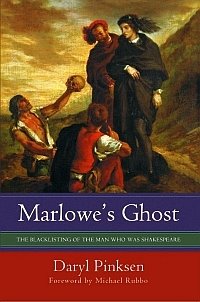
In a comment left on The Clyde Fitch Report for an article titled "Heretic’s Foundation VI: Supreme Court Pricks Shakespeare Bubble" (Friday, June 26, 2009), Oxford defender Howard Schumann provides a list of reasons why Marlowe could not have written Shakespeare.
I was particularly amused by this assertion:
2. Marlowe is so distinctive a poet and dramatist that it is hard to believe he could have also been Shakespeare.
This is a fair challenge - one that's easily countered with a review of the literature of Marlowe's influence on the works of Shakespeare - but a legitimate point of debate nonetheless. While the argument may be valid, however, the source of the challenge is not.
Mr. Schumann, as a proponent of the Oxfordian case, has missed the irony of his claim. In the nineteenth and early twentieth centuries, it was a commonly held view of mainstream scholarship that Marlowe was a part author, and sometimes the primary author, of much of the early Shakespeare canon. And while nowadays the story has shifted, so that Shakespeare is regarded to have begun his career imitating Marlowe's style, both explanations are based on the undeniable similarity of the two bodies of work.
And what of Oxford? Does his work remind us of the works of Shakespeare? Not even close. Here is a sample, as posted on www.Oxford-Shakespeare.com:
1.The Earl of Oxford to the Reader.
The labouring man that tills the fertile soil
And reaps the harvest fruit hath not indeed
The gain, but pain, and if for all his toil
He gets the straw, the lord will have the seed.
The manchet fine falls not unto his share,
On coarsest cheat his hungry stomach feeds.
The landlord doth possess the finest fare;
He pulls the flowers, the other plucks but weeds.
The mason poor, that builds the lordly halls,
Dwells not in them, they are for high degree;
His cottage is compact in paper walls,
And not with brick or stone as others be.
The idle drone that labours not at all
Sucks up the sweet of honey from the bee.
Who worketh most, to their share least doth fall;
With due desert reward will never be.
The swiftest hare unto the mastiff slow
Ofttimes doth fall to him as for a prey;
The greyhound thereby doth miss his game we know
For which he made such speedy haste away.
So he that takes the pain to pen the book
Reaps not the gifts of goodly golden Muse,
But those gain that who on the work shall look,
And from the sour the sweet by skill doth choose.
For he that beats the bush the bird not gets,
But who sits still and holdeth fast the nets.
This is an earnest effort, but betrays a rather clumsy execution. One can see why Oxford's poetry is not part of the syllabus of our English literature instruction.
Whether Marlowe's style is similar enough to the early Shakespeare works to warrant a claim to their authorship is a matter of contention, but there is no question that the work attributed to the Earl of Oxford is that of an amateur.
The irony continues:
Schumann and his fellow Oxfordians contend that Oxford chose to hide behind a "front" because of his noble status. Supposedly there was some shame for a nobleman to allow the public to think he was a poet of unparalleled genius. But it is precisely because of his noble status that these forgettable poems - poems Oxford evidently was pleased to have circulate in his name - survive.
If these poems had been written by the son of a glover, or a cobbler, they would most likely have been consigned to the dustbin of literary history.
If you are in doubt about the Oxford claim, please go to the source and read the "poetry" of Edward de Vere for yourself.
© DARYL PINKSEN 2009
Explore the website: www.MarlowesGhost.com



No comments:
Post a Comment